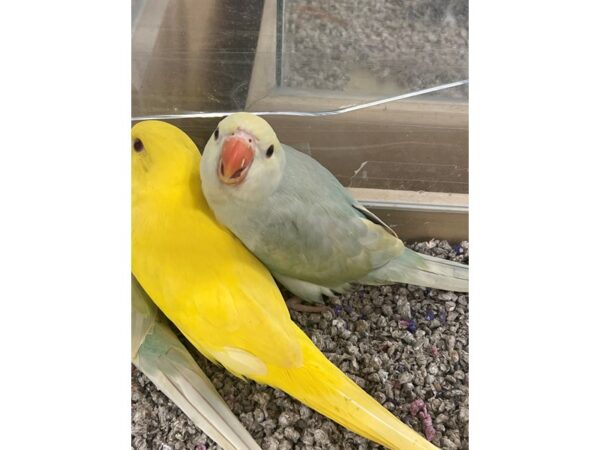Indian Ringneck Parakeet
Owning an Indian Ringneck Parakeet as a pet can be a delightful experience, but it requires careful consideration and dedication. Here's some basic information for prospective owners:
1. Lifespan: Indian Ringneck Parakeets have a relatively long lifespan, often living between 20 to 30 years or more in captivity. Potential owners should be prepared for a long-term commitment when adopting one of these birds.
2. Size: These parakeets are medium-sized birds, typically measuring around 14 to 17 inches (35 to 43 cm) in length, including their tail feathers.
3. Diet: A balanced diet is crucial for the health of Indian Ringneck Parakeets. Their diet should consist of high-quality pellets formulated for small to medium parrots, supplemented with a variety of fresh fruits, vegetables, nuts, and seeds. It's important to avoid feeding them foods that are toxic to birds, such as avocado, chocolate, caffeine, and foods high in salt or fat.
4. Housing: Indian Ringneck Parakeets need a spacious and secure cage to accommodate their active nature. The cage should be large enough to allow them to move freely and include multiple perches of varying sizes, toys for mental stimulation, and space for flying and exercise. Regular out-of-cage time is also essential for their physical and mental well-being.
5. Socialization: These parakeets are highly social birds that thrive on interaction with their human companions. They require daily socialization, mental stimulation, and physical activity to prevent boredom and loneliness. Owners should spend time interacting with their birds through play, training, and gentle handling.
6. Training: Indian Ringneck Parakeets are intelligent birds and can be trained to perform tricks, mimic sounds, and even speak. Positive reinforcement techniques, such as clicker training and offering treats, can be effective in teaching them desired behaviors.
7. Vocalization: Indian Ringneck Parakeets are known for their vocal abilities and can be quite noisy, especially during the morning and evening hours. Potential owners should be prepared for noise and consider their living situation and neighbors' tolerance levels.
8. Veterinary Care: Routine veterinary check-ups are essential to monitor the bird's health and detect any potential issues early on. Find an avian veterinarian with experience in treating parakeets to ensure proper care and treatment.
 Adopted
Adopted